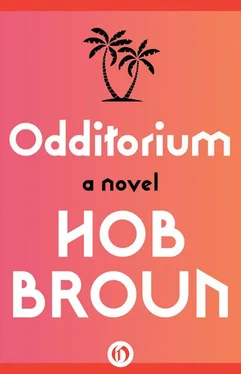“A little music, my friend? So you will forget the heat.”
The Syrian cranks the Victrola, lowers the bamboo needle onto the record. Always the same record: “Velvet Moon” by Harry James and his Orchestra. The Syrian conducts with his magazine and the band follows perfectly, as always. One thing you have to say for him as a boss, he really works at it.
Karl shanks in one last wedge of stone and it’s time to strap on the basket again and go scrounging for more. Every rock in the immediate radius has already been used. Sometimes he has to go clear back to the river for a full load. Is this the way they built the pyramids?
“No no, something else now.” The Syrian motions him to put the basket down. “The shade is here, so be putting Xerxes to graze.”
Xerxes is the donkey. High on his rump he still carries a bullet from the night when the Syrian, enraged at finding a case of white rum bought off a nigger sailor was nothing but water and white vinegar, emptied his antique revolver in the moonlight. Xerxes has his own house to live in. Not with furniture or anything, but it’s one of the outbuildings with windows and a door.
“What you clean out of his room you can spread on the garden.”
“Tell you what, I don’t get something to drink I can’t guarantee I’ll be standin’. If I ain’t standin’, I can’t be shovelin’ neither.”
“Fanta?” The Syrian brings out a warm orange drink from inside. Snapping his memo book open, moistening the tip of his pencil with a little kiss, he adds another five pesos to Karl’s account.
Xerxes puts his puny head out the window. He brays noisily and goes back to chewing the sill. They are late letting him out today and he doesn’t like it at all. The Syrian moves to the hollow gourd placed to catch the drip from his irrigation pipes. Two miles of bamboo irrigation pipe carved and laid by people from the settlement to work off their debts.
“ Para servir a tu, mi mozo .”
He tilts the gourd, dribbles water along the donkey’s lapping tongue.
Christo lowers the basket. He crouches by it at the edge of the path.
“You should rest, Don Alfonso. We’ve come a long way.”
Zarzuela glances up, shrugs, stirs the brush with his long stick. They have been gathering vines most of the day. They have been hiking through the forest with eyes on the ground, attentive for the small white flowers that always grow nearby. The Father makes such signs for us to follow, Zarzuela instructs.
Many years ago there were missionaries on this part of the river. They had come all the way from Sedalia, Missouri, to translate the Bible into the language of the Indians and lead their souls to His everlasting mercy; three men and a woman who had never been further south than Memphis. Without Zarzuela they would all have died. He cooked their meals and washed their clothes and cared for them when they were sick. He built their shelters and the open-sided chapel. He rebuilt the chapel after it burned down. He quickly mastered their language, read the elevating texts of Schweitzer and Dr. Peale, sang hymns in a strong baritone. And when the woman looked at him with begging green eyes, he did not yield.
But he never believed in their God. Not for a second.
The sun is low when they reach the ravine. They climb along a shelf of rock to the cave where Zarzuela keeps his spirit devices: large brewing pot, striped blanket, leather pouch containing necklaces of teeth, dried paws, bundles of feathers. Christo is about to collect wood for the fire, but no, something else to be done first. Zarzuela leads him to a shallow stream. They bathe and put on the spotted skins. Zarzuela has the smooth taut complexion of a much younger man. His movements are soft, luxurious. In the bottom of the pot he places a flat white stone that gleams up through the water like an eye.
Chopped and split with a machete, the vines are pitched into the boiling pot. Soon a thick greenish scum brims over and sputters on the coals. While they watch and wait, squatting on the blanket amid bitter, clinging smoke, Zarzuela tells the story of the first woman in the world.
The daughter of the Master of Fish lived at the bottom of the river. She was young and restless and impatient with the cold darkness that surrounded her. One night she decided to swim up out of the black trench and explore other places. Down on the bank of the river the men had lit a great fire to prepare their yagé . The daughter of the Master of Fish was attracted by its glow and swam closer. Her father had warned her never to go near the surface of the water, but the closer she came to the light the brighter it became and the more it drew her on. The youngest of the men heard the disturbance in the water. He ran down to the edge and found the daughter of the Master of Fish floating on her side. She was helpless in this new world. The light blinded her and the heat of the fire dulled her mind. Using a thorned vine, the young man pulled her onto shore, lay down and possessed her. This was the first woman in the world.
Finally, satisfied that the yagé has brewed long enough, Zarzuela spits on his hands and lifts the pot away from the fire to cool. He brings out two wooden cups decorated with wavy black lines.
“You must give up all you know,” he says, washing both cups with sand. “To the Father you must open yourself like a woman and wait for his touch.”
Christo nods obediently. His mind has never been so empty.
“If you are lost, I will be here to guide you back.”
“Mil gracias , Don Alfonso.” Christo lifts the cup to his mouth.
Lita’s boy has been brought outside on a pallet so that his sores can bake in the sun. He can watch the téjo from here. The harmonica is almost too hot for his lips to touch, but he blows a low note and prays for Tildy to win.
A wide board is propped against a tree. Near the top a circle has been drawn with charcoal and at its center, fastened with a bit of pitch, is the blasting cap. Tito has two boxes of them, which he keeps in a secret place. He worked on a road gang long ago.
Now the men are choosing their stones, passing a jug of cassava beer. Chewing on her nails, Tildy stands off from the others. She looks at the tipping hut made of cardboard and tin cans hammered flat; it belongs to the little man known as Señor Equis. He sits outside with the flat rock he has painted to look like a transistor radio. She can smell the strips of meat drying on his roof as he looks up, smiles, waves.
Tito paces off the distance and scratches a line in the dirt with his heel. The men jostle and maneuver behind him, arguing over the order in which they will throw. Unregarded, Tildy is a shadow among them, weighing her three stones. It is not hostility they feel toward her, not complacence. She is just there, a part of the landscape that surrounds them but to which they have no real connection, like a bush whose name they do not know although they eat its fruit. Tito spreads his arms, nudging the others back to give him room. He sights along one pudgy finger, rocks back and throws the first stone. It strikes inside the circle but well away from the blasting cap. The next two are not as close and Tito is visibly annoyed, pushing the beer jug away when it is offered. Hector of the narrow shoulders and crooked lips has had more beer than anyone, which is okay since he made it. His first two throws don’t even hit the board and Jaime says why doesn’t he practice on something large like his wife’s head. Hector aims his last shot at Jaime but hits a clay jar instead, breaking it. Brilliant, Jaime says. The throw of the year.
While everyone clusters around the broken jar to discuss what kind of restitution should be made to its owner, Tildy slides up to the line and lets go. The fat stone, vaguely triangular but smoothed by the action of the river, slams into the black, kicks up a tiny dust cloud. The next lands in almost the same place; a piece chewed out of the circle, two prongs that don’t quite meet. Only Lita’s boy is watching her. He thinks she is even more beautiful than the Virgin of Chinquinquira, whose picture is tacked up over his hammock. On her last try Tildy goes sidearm, pushing off with such force that her follow-through carries her halfway around and her back is turned to the quick bang like a bullwhip on stainless steel. Lita’s boy honks jubilantly on his instrument. The applause of Señor Equis is so light and dry that only he can hear it. So she’s done it again — the men spit and shake their heads. Anyway, it’s kind of a stupid game. Hey, Hector, what do you say we break out another jug?
Читать дальше












